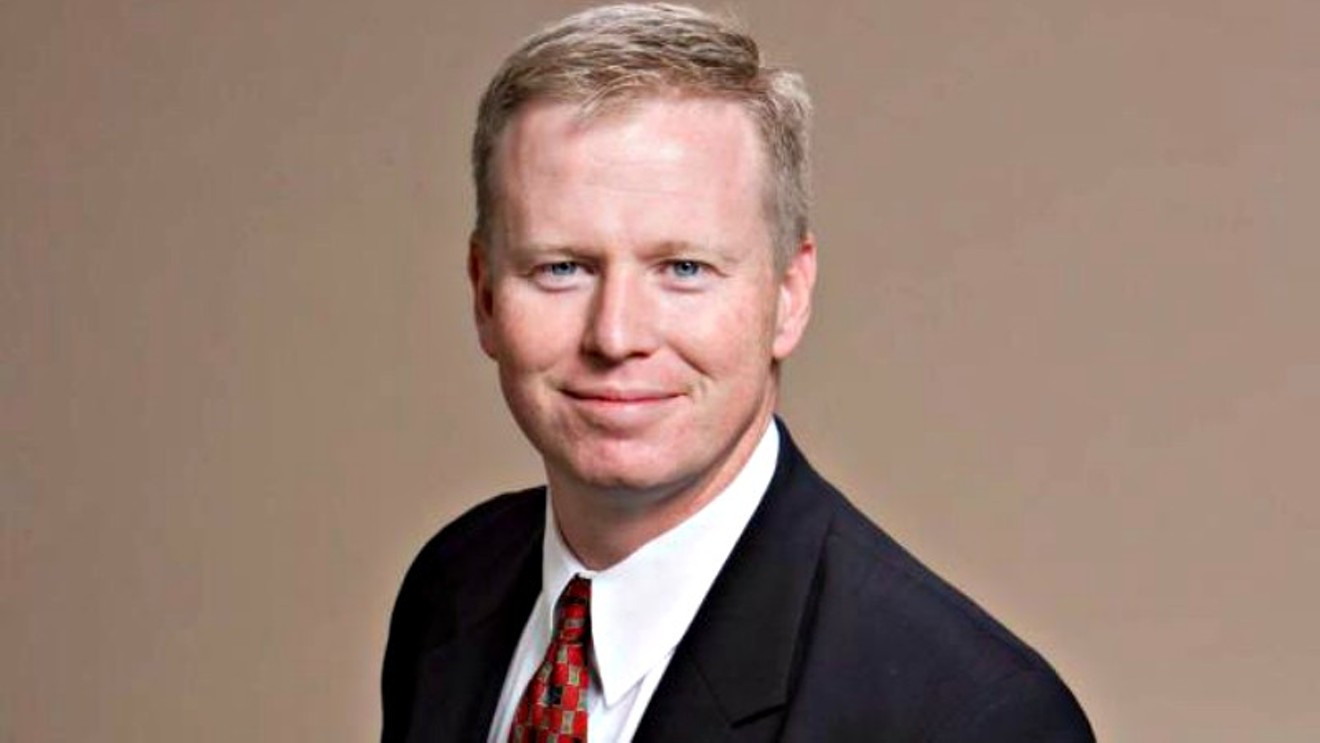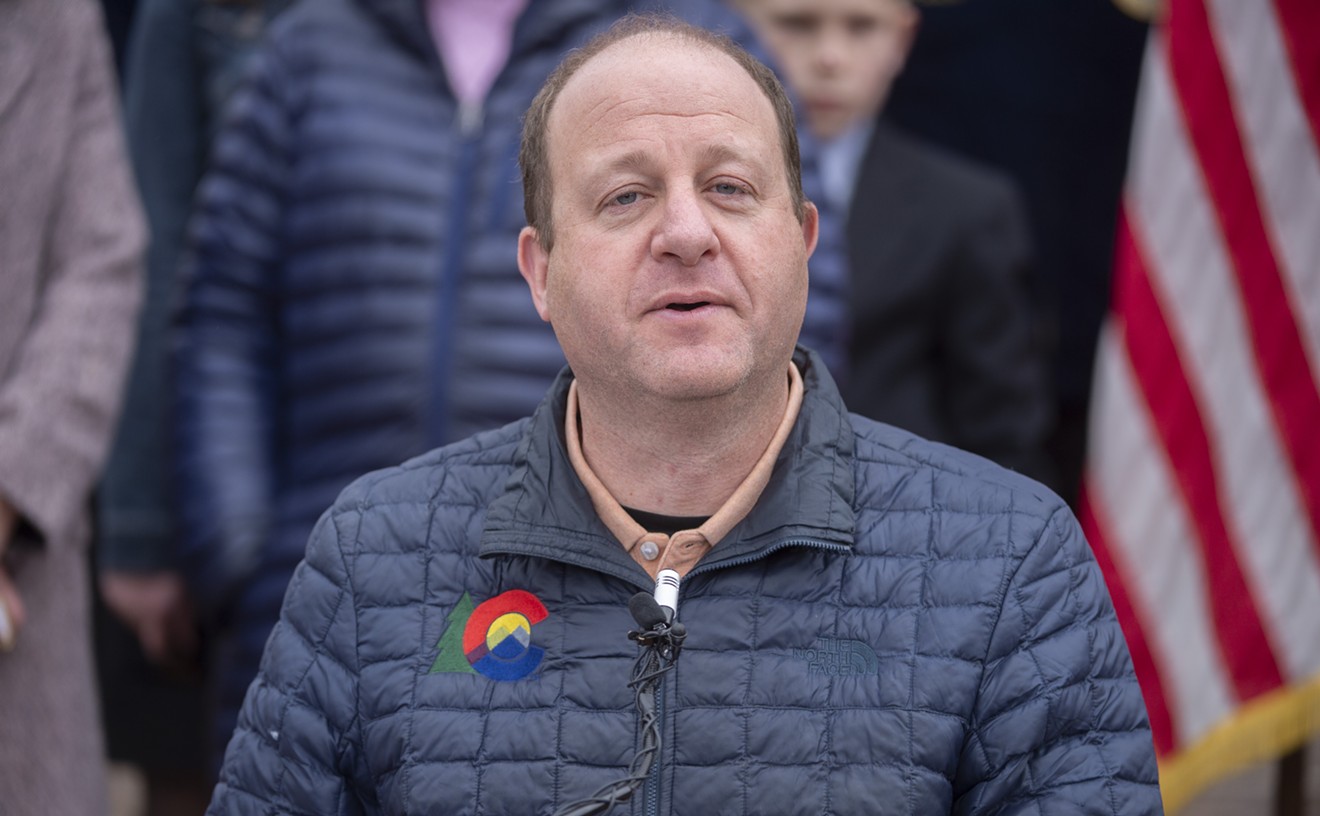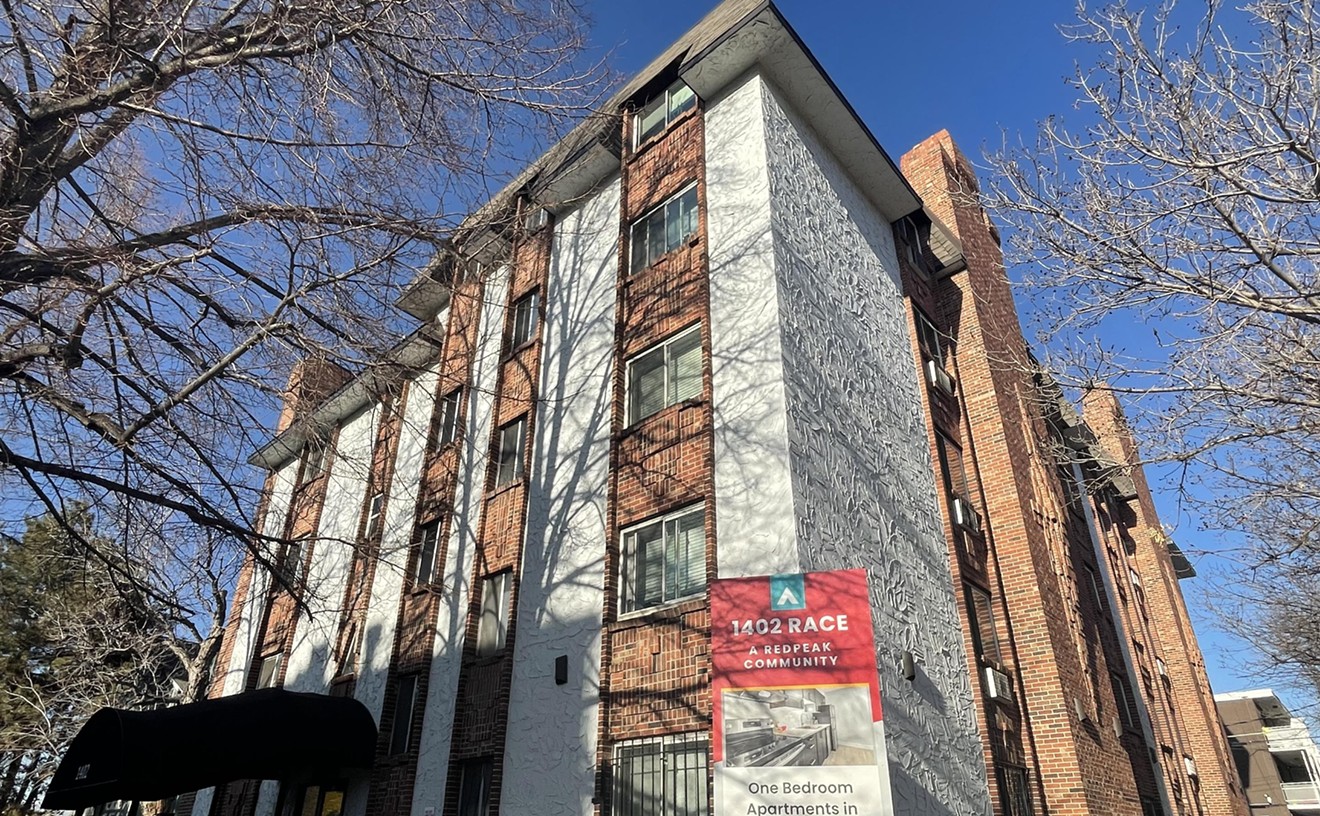Yesterday, November 13, 18th Judicial District DA and Aurora theater shooting prosecutor George Brauchler pulled out of the race for Colorado governor in 2018 in order to run for state attorney general in the wake of AG Cynthia Coffman's own gubernatorial bid. Shortly after the announcement, Brauchler spoke to us in detail about the motivations behind his decision and his take on both the governor's contest and the competition for attorney general in a frank Q&A on view below.
During the conversation, Brauchler directly addressed suggestions that he'd shifted course because of weak fundraising numbers; he collected $99,000 during the most recent reporting period even as Walker Stapleton, Colorado's treasurer and a major rival, was poised to benefit from a big money Super PAC and an upcoming event being hosted on his behalf by former Denver Broncos coach Mike Shanahan. Additionally, he talks about claims that his campaign had lost its balance with the departure of manager Ryan Lynch, conversations with other potential attorney general candidates that preceded his most recent move, his hope that he won't have a primary challenger for the new office, and his analysis of Democratic Party challengers for attorney general, including Phil Weiser, who he sees as a relative mainstreamer, and Joe Salazar, a comparative "bomb thrower" in his view.
Here's what Brauchler had to say.
Westword: What influence did fundraising, and the big wallets of other candidates, have on you setting the governor's race aside in favor of the attorney general's office?
George Brauchler: I'd say it was a factor, and certainly part of the discussion. Honestly, though, but for Cynthia leaving the AG's race, I would have kept moving forward. There was never a discussion of "Should we suspend the campaign or stop doing this because it's become difficult?" I was in it to win it and moving forward. But Cynthia kind of popping smoke the way she did less than a year before the general — well, that precipitated a whole bunch of phone calls and other discussions. And certainly some of it was the fundraising stuff, but it wasn't the number one issue. The number one issue was, "What are we going to do to hold the AG's race?"
Some reports in recent weeks implied that your campaign was in turmoil. How would you characterize it?
As a lean, mean fighting machine. We had been moving ahead at a great clip. But as you pointed out, the money piece had an impact, and one of those impacts was, how do you properly retain good, qualified staff long term when you're still working the fundraising piece out and looking at 2018? So we made just one change [Lynch's departure]. I don't know if that's turmoil or not. But between us and the campaign manager, we just had an agreement that we would keep moving forward with different opportunities.
I think the money piece impacted that a little bit. We were trying to keep as much cash on hand as we could going into 2018, and trying to figure out, do we have to spend it on the assembly to take on a Tom Tancredo or some other conservative candidate, or do we have it available to us to spend it between the assembly and the primary — and what are our prospects for raising other money? These are all part of the conversations. But turmoil is a significant overstatement for a campaign that won every single straw poll, and had the highest fundraising of any Republican.
In perspective, I get it . We were earning one-third of what the Democrats were. But in that last quarter, we out-raised every single Republican candidate. And if you go back and look, in the two weeks Walker was in the campaign and the two weeks we were with him at the same time, we out-raised him in those two weeks. So there was no sense of turmoil at all. I just think we're all planning for the future.
You mentioned Tom Tancredo. What impact was there from his entry into the race, as well as the results of a poll showing him leading the Republican pack even before he declared?
Him coming in didn't make me reconsider, but it was definitely the biggest hurdle to be thrown in front of us in the campaign. Like Walker entering the race: That didn't really impact us. And nobody else who entered into the race rally impacted us, either. Tom jumping into the race, because he's a legitimate conservative, did impact the race for us. But it was really about Cynthia leaving the AG's race. [Congressman] Ken Buck might have entered the race, but in the absence of those things, I would still have moved forward as I had been. Had Cynthia stayed there or had Ken announced, I would still have been moving forward and looking to win the nomination for governor. So Tom Tancredo was a challenge for us to tackle in the campaign, but it wasn't the precipitating thing at all.
In recent years, Colorado voters have routinely elected Republicans to serve as attorney general. Did you feel that if you didn't declare for that office, there was a legitimate chance the Democrats could win?
I think there was a real concern that whoever was jumping into the race, me included, was starting well behind the other Democrat, progressive candidates, all of whom have been in this race for many, many months and have been raising big dollars. Phil Weiser, I think he must have a printing press in his garage. That guy's got to have three quarters of a million dollars or more. That's real. And so yeah, I think there was real consternation about "What are we going to do with a year left to put up a candidate who can still hold this seat?"
What's going to happen to the money you raised as a gubernatorial candidate? Will you be able to use it in your run for attorney general?
There is a rule out there that the Secretary of State, I think, promulgated. But I'll be honest with you: I don't know what that total [his campaign can keep] is. I think it's $100,000 or maybe a little bit more. But I don't know for sure, and we're trying to figure that out now. And whatever that number is, yes, we're going to seek to transfer those dollars over.
Will the rest be refunded to donors?
I don't know what other options there are.
How do you see the governor's race moving forward? Does the number of candidates complicate things? And do you have a favorite among the folks still running?
As far as a favorite goes, I don't. I've had a lot of people ask, "Are you going to endorse in this race?" And of course I am — right after the primary. It just doesn't make sense with the amount of time left to vet candidates for me to weigh in one way or another now. I don't think it's fair to the process, I don't think it's fair to the participants who are still in there fighting for the nomination. So I'm going to keep my powder dry and see what this process reveals. I think that's important.
In terms of the number of candidates in there, does it complicate things? I think it does. It lacks credibility to say, "No, nothing that happens in the race impacts my thought process on how we win." And I'm not entirely convinced that this field is settled. Does a Jack Graham jump in? Does a John Elway? Does a Todd Helton? Some of that is facetious, but who knows who's lurking out there who might want to run for governor. And that might be true for attorney general as well. So all of those things go into your decision-making.
But when you get right down to it and start analyzing, "What do I need to do to win?", well, if you're the grassroots conservative, like I was trying to be, and get through the assembly, you've got a multiple-step process. One is, how do I get onto the ballot through the assembly? You don't want to come in second place at the assembly, because second place means you lose. If you can't win the assembly, it's hard to win the rest of the state. But if you win, do you have the ability to structure it so that you can keep other potential contenders off the ballot?
I've got to say, if four or five or six candidates go through the assembly, depending on how strong those candidates are, somebody with 30 percent of the vote may be the only person to achieve 30 percent and the only person to get out of the assembly. But then you've got to decide, how much did I have to spend to get that outcome? And then you look at all the people with enough money to simply petition on: the Vic Mitchells, the Doug Robinsons, the Walker Stapletons. Maybe Cynthia — I don't know. But all of those people are going to be on the ballot. How are you going to take them on when you've spent all your money just to take on the assembly? So these are all factors that have to be analyzed. But I get back to this: But for Cynthia leaving the AG's race when she did, I don't make this decision. If she jumped into this race six months ago, when it was first rumored about, I'm not making the move over to AG. I'm still plugging along, I'm still moving head-first into this thing, and I don't know who's running for AG. But it happening less than a week ago? That was a big difference maker.
What's your take on the Democrats who are running for attorney general?
It's so interesting. The Democrat side is an interesting piece of this puzzle. I think what you have going on is a microcosm of what's happening at the national level. You have Phil Weiser, the dean of the CU law school and somebody who I'm very friendly with. I like that guy; he's a nice guy. But he's been raising huge coin. And even though he's described himself as a progressive and I take him at his word, he's not nearly as progressive as Joe Salazar. Joe Salazar was Bernie's front man here in Colorado and he bills himself as sort of the heir apparent to that Bernie Sanders-like movement.
What I think you're going to see ultimately is a battle between those two for the nomination. And that's going to be a reflection of what's going on internally in the Democrat party. Are they voting for someone who's a little more mainstream, a good fundraiser, a little more establishment, or are they going to go with the bomb thrower, the guy who's going to burn it all down? And those two extreme positions — maybe I haven't done them justice in my description, but that's what you're looking at. Is it going to be the more establishment guy or the more Bernie-like guy? I think that's fascinating.
On our side, I would love, as any candidate would, to not have to take on a primary challenger on the way to the nomination. But I'm prepared to do that, and I'm going to run the same positive pro-Colorado, pro-Brauchler campaign as I did as governor. But my druthers would be, especially since we're starting off way behind the Democrats on this, that I can just focus on November. If that's the case, I think we'd be much better positioned to succeed.
Did you make any agreements or have any assurances from the state Republican party before you announced for attorney general that the field would be clear for you?
I don't know if other people could get in. But I do know — and any candidate would do this — that I spoke with other people who might be interested in running. I spoke with Ken Buck, I spoke with [assistant Colorado House minority leader] Cole Wist, and there were no agreements or anything. We just had a very candid discussion: "Hey, what are you thinking about doing? This is what I'm thinking about doing. I'm going to make a decision, probably early next week." Ken's going to run again for Congress, which is an important position to hold. Cole has said he's going to continue to work for a House majority, and that he wants to continue to play a leadership role there. I respect those things. But I have no promises from anybody.
It's funny: I think outside the political circle, like in the TV or movie world, people think the Republican Party, or any party, has the ability to reach down and say, "Okay, I pick you and not you." That's not Colorado, man. I don't know about the Democrat side, but the Republican Party isn't built that way. I spoke with [Colorado Republican Party chairman] Jeff Hays this morning, and Jeff made it clear, "Good luck to you. We'll be here to provide the services we'd provide to any other candidate, but there's really nothing I can do to prevent anyone else from running."
I take him at his word and I think that's legitimate. My hope is, whoever is thinking about running gives me a call first and we have a conversation about it. And if I can't dissuade them from causing a primary, we're just going to have a good, healthy contest and try to generate the best candidate for the general election.
[
{
"name": "Air - MediumRectangle - Inline Content - Mobile Display Size",
"component": "12017618",
"insertPoint": "2",
"requiredCountToDisplay": "2"
},{
"name": "Editor Picks",
"component": "17242653",
"insertPoint": "4",
"requiredCountToDisplay": "1"
},{
"name": "Inline Links",
"component": "18838239",
"insertPoint": "8th",
"startingPoint": 8,
"requiredCountToDisplay": "7",
"maxInsertions": 25
},{
"name": "Air - MediumRectangle - Combo - Inline Content",
"component": "17261320",
"insertPoint": "8th",
"startingPoint": 8,
"requiredCountToDisplay": "7",
"maxInsertions": 25
},{
"name": "Inline Links",
"component": "18838239",
"insertPoint": "8th",
"startingPoint": 12,
"requiredCountToDisplay": "11",
"maxInsertions": 25
},{
"name": "Air - Leaderboard Tower - Combo - Inline Content",
"component": "17261321",
"insertPoint": "8th",
"startingPoint": 12,
"requiredCountToDisplay": "11",
"maxInsertions": 25
}
]














